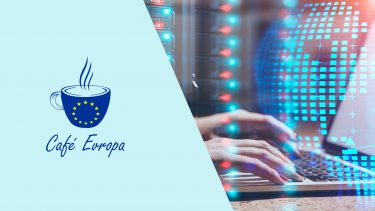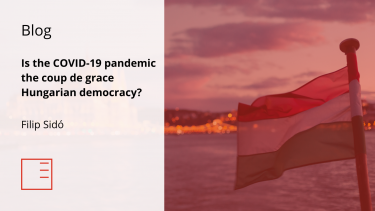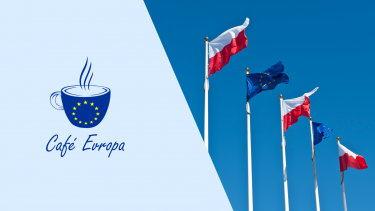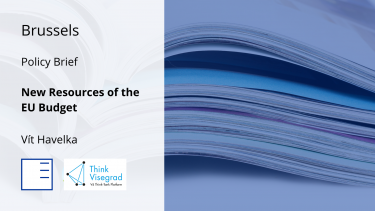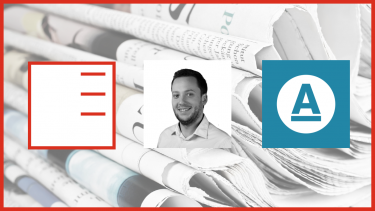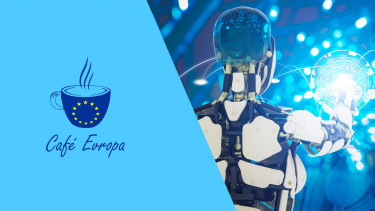INVITATION: Café Evropa online: EU Digital Package - how will it affect online services in Europe?
We would like to invite you to a debate "Café Evropa online: The EU Digital Package - How will it affect online services in Europe?". The debate will take place online on 31 March at 17:30. The debate will be in Czech and you can watch it on our Facebook page.
Show moreDeník N: The Green Deal is more important than ever, says the Decarbonising Automotive Transport conference
Our researcher Michal Hrubý attended the conference on Decarbonisation of Automotive Transport where he took part in the debate. We are on the threshold of a decision about the future of Czech car transport. Demand for electromobility is growing exponentially globally, as is the development of battery technology. In the future, these could become value-added products that will kick-start our economy and return the Czech Republic to a leading position in the investment environment. According to representatives of the European Parliament, the state administration, the automotive industry and independent experts on electromobility, it is now important for the Czech Republic to leave the scepticism of change behind and start educating and preparing for the decarbonisation of automotive transport. Not only for the environmental impact, but especially for the future competitiveness of the sector. This was stated in a debate at the Decarbonisation of Automotive Transport conference organised by EUROPEUM Institute for European Policy on Tuesday 1 March.
Show more
BLOG: Is the COVID-19 pandemic the coup de grace Hungarian democracy?
Intern Filip Sidó wrote a blog on "Is the COVID-19 pandemic a coup in Hungarian democracy?" in which he discusses the newly declared state of emergency in Hungary, which allows Prime Minister Orbán to rule through decrees that essentially give him unlimited power.
Show more PDFBLOG: Is the COVID-19 pandemic the coup de grace Hungarian democracy?
Stážista Filip Sidó napsal blog na téma "Je pandemie COVID-19 převratem v maďarské demokracii?", ve které se zabývá nově vyhlášeným nouzovým stavem v Maďarsku, který premiérovi Orbánovi umožňuje vládnout pomocí dekretů, které mu v podstatě dávají neomezenou moc.
Show more PDFINVITATION: Café Evropa online: The security situation in Eastern Europe - how much are we at risk?
We would like to invite you to the next debate within the Café Evropa series, this time on the topic "Café Evropa: The security situation in Eastern Europe - how much are we at risk?" The debate will take place on 3 February at 17:30. What are Russia's intentions in Eastern Europe? If diplomacy fails, is war with Russia a realistic scenario? Is the EU being bypassed on resolving tensions on Ukraine's borders? What exactly is Moscow seeking in relation to the Czech Republic and other Central and Eastern European states?
Show moreINVITATION: Café Evropa online: Poland versus the EU - where is the Polish government heading?
We invite you to the first debate of the Café Evropa series of this year, this time on the topic: "Poland versus the EU - where is the Polish government heading?". The debate will take place on February 1st at 5:30 pm online on our Facebook page. What steps is the EU taking in relation to Poland and should it take tougher action? Wouldn't such a step interfere too much with national competences? What tools can the EU use against Poland and what role does the Polish National Recovery Plan play in this situation? How real is Polexit - Poland's withdrawal from the EU?
Show morePolicy Brief: New Resources of the EU Budget
Our researcher Vít Havelka, in his article "New Sources of the EU Budget", which was created under the Think Visegrad in Brussels project, writes about the new own resources of the EU budget, which are currently being discussed at the European level. The text specifically discusses why the reform of own resources is necessary and what are the positions of the various EU institutions and member states on these proposals. It concludes with a reflection on the Czech position, including an outlook on how it might evolve depending on the course of the negotiations.
Show more
Aktuálně.cz: Domino effect in Central Eastern Europe? EU criticises attacks on media in Slovenia
Slovenia is beginning to resemble Hungary in many ways. The European Parliament's attention has been drawn, among other things, to pressure on journalists and independent institutions. Žiga Faktor, head of the Brussels office of the Institute for European Policy, commented on the state of the rule of law in Slovenia for Aktuálně.
Show more
INVITATION: Café Evropa online: Artificial Intelligence - why does it need to be regulated and what impact will these regulations have on European citizens and
Although the EU is aware of the enormous benefits of AI in the daily lives of European citizens, its current low level of regulation could cause significant problems in the future. That is why, as part of its efforts to strengthen trustworthy AI, the European Commission approved the long-awaited Regulation on an European approach to AI in April 2021. We invite you to another Café Evropa debate, this time on the topic of artificial intelligence. The debate will take place on December 9 at 17:30 online on our Facebook page.
Show moreSWP: Between change and continuity: European expectations towards Czech and German EU policies after the 2021 elections
For the German Institute for International and Security Affairs, Žiga Faktor, Director of our Brussels office, and Zuzana Stuchlíková, Research Associate at EUROPEUM Institute for European Policy, co-authored an article on the European expectations of the Czech and German governments' European policy.
Show more PDF

Staroměstské náměstí 4/1
Prague 1 - Staré Město
110 00
tel.: +420 212 246 552
email: europeum@europeum.org
https://www.europeum.org
